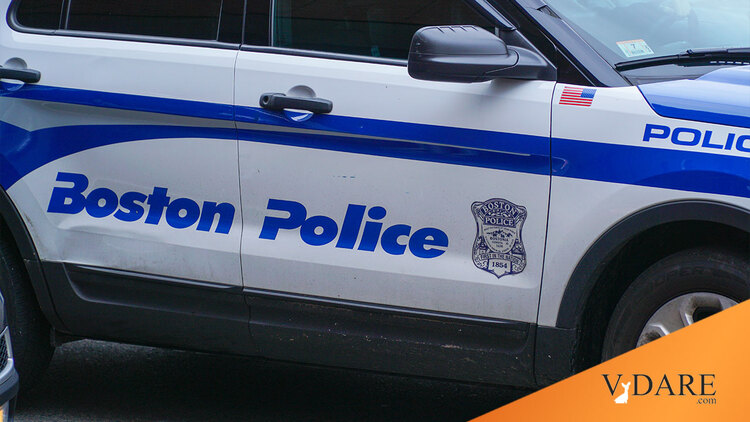


By Paul Kersey
04/15/2023
Boston is 44 percent white and 23 percent black. Our friends at the Boston Herald have just confirmed that if the city had no black population, it would have no fatal/nonfatal gun violence.
“Further, 84.6%, or roughly 115 of the city’s 136 homicide victims, and about 78%, or 49 of 63 homicide offenders from 2020-2022 were Black … “. Way to bury the lede.
Boston gun violence concentrated in four neighborhoods https://t.co/aPJO9Exa6o
— Leo Kiely (@kiely_leo) April 8, 2023
Boston gun violence concentrated in four neighborhoods, by Gayla Cawley, Boston Herald, April 8, 2023
A weeklong workshop aimed at reducing gun violence in Boston concluded that most of the crimes were occurring among a small number of people in four neighborhoods, with primarily Black men harmed.
The data, compiled by the Boston Police Department, show serious violence was highly concentrated in Dorchester, Jamaica Plain, Mattapan and Roxbury from 2018 to 2022, according to a presentation provided by the city.
Further, 84.6%, or roughly 115 of the city’s 136 homicide victims, and about 78%, or 49 of 63 homicide offenders from 2020-2022 were Black, with the majority of these crimes committed by or killing men in general.
“We will not tolerate any neighborhood feeling like residents have to live in fear of violence or experience loss that ripples down, generation after generation,” Mayor Michelle Wu said at a Friday press conference in Roxbury. “We have the resources. We have the expertise. We just have to put it all together.”
The data presented at this week’s Violence Reduction Center Cohort, a new training program for law enforcement, community leaders and service providers, will help Boston target intervention strategies, as it grapples with a spike in homicides, said Isaac Yablo, Wu’s senior advisor for community safety.
“We do have a lot of short-term solutions, in terms of employment opportunities, education opportunities, mentorship opportunities,” Yablo said. “But the solution is to address root causes and reinvest into the communities that have been most impacted.”
This week’s training sessions, hosted by the University of Maryland Violence Reduction Center, concluded that both long- and short-term solutions, involving a blend of criminal justice, social service and community interventions, are needed to lessen gun violence in Boston, according to the presentation.
The city’s participation in the new program comes as homicides are on the rise there. According to Boston Police Commissioner Michael Cox, homicides are occurring at more than twice the rate as this time last year, 11 compared to five, and outpace the five-year average of 9.5, during that time period.
Thirty-one of the 180 shootings that occurred last year were fatal, a higher number than the 27 gun-related homicides that occurred in 2021, but lower than the 45 BPD recorded in 2020, according to department data.
The mean age of homicide victims and offenders was nearly identical from 2020-22, at roughly 32 years old, but each group included people as young as 14. A rise in juvenile firearm arrests was seen from 2018-20, 9.8% to 18.4%.
The data also show most homicide victims and offenders were known to the criminal justice system before the event occurred, at 74.4% and 84.1%, respectively.
Further, 36% of 1,045 shootings from 2018-22 were gang-related, which the Boston Police Department described as a “very conservative estimate due to data limitations.” BPD data suggests there are 85 gangs, with roughly 1,800 members.
Yablo said the city’s investment in neighborhoods most impacted by gun violence will target “those people that are closest to the pain.”
One of these interventions will be a healing tour, an idea first discussed in October, by community leaders trying to figure out a way to speak to residents in the four neighborhoods most impacted by violence, said Donnell Singleton, CEO of DS Consultants.
The community-led tour, which will launch in the coming weeks in partnership with the city, “is about giving the community an opportunity to heal from things that we’ve yet to heal from,” Singleton said, citing busing, the crack epidemic and unaffordable housing as past traumas impacting Black residents.
“I’m a Black man who suffers from PTSD, which is real,” Singleton said. “In case you don’t know what that is, that’s post-traumatic slavery syndrome. We’re still dealing with the aftermath of that.”
Yes, busing, the crack epidemic and unaffordable housing (living near law-abiding white people) is the reason black shoot other black people…
Imagine if every major U.S. city had a police department publishing comprehensive racial data on who/whom is committing violent crime? Perhaps we could craft coherent social policy once discernible patterns emerge.
In a more civilized time, we called this Jim Crow. We called this an America ruled by the Naturalization Act of 1790.